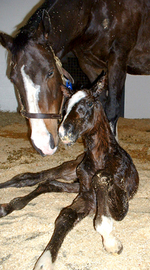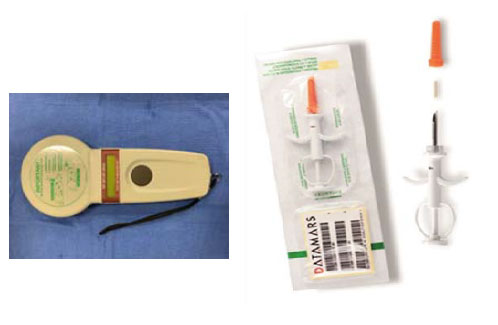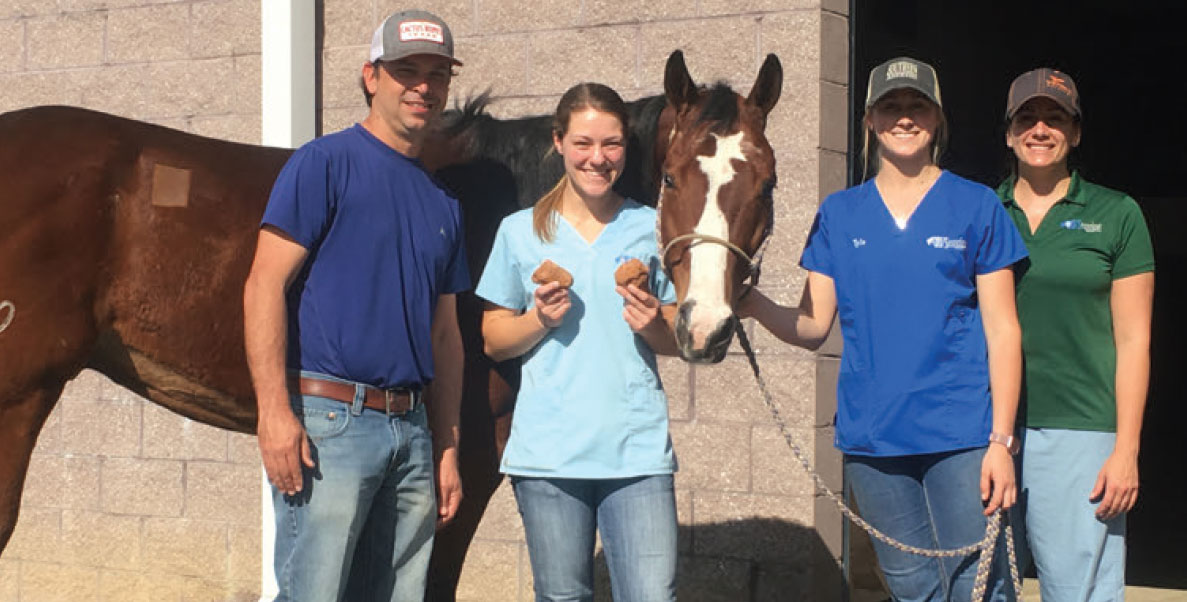With a newborn, care in a timely manner is critical….
Last year you bought that special mare and bred her to that special stallion and after almost a year of waiting and making sure the mare had every nutritional and environmental advantage available to her, the time for the foal’s birth is here. You made sure the mare got all her pre-foaling vaccinations four to six weeks before her due date and you have made all the correct decisions in this process so far. Now you have to decide whether or not to let the mare take care of the birthing process on her own or do you make sure someone is with her when she foals?
Not having a knowledgeable and experienced person with the mare when she foals is like driving ninety nine yards for the touchdown and deciding to stop on the one yard line. It just doesn’t make sense. There is a tremendous amount of expense that has already gone into getting a healthy foal on the ground. Depending on how many foals you raise each year, if you loose one foal because no one was there to help with any problems, then you have lost any amount of money you may have saved by not having the mare monitored during foaling. You have especially come out behind if you consider possible lost earnings of the foal and possible record enhancement to the mare, stallion and your breeding program. It is also much less expensive to prevent a problem than it is to treat one.
One of the relatively common problems that can develop in new born foals and especially those that have unmonitored births is the “dummy foal” syndrome. This syndrome can be caused by a short period of time during the birthing process that the foal does not receive enough oxygen. The lack of oxygen causes the mental abilities of the foal to be diminished for up to a few days. The lack of oxygen could be caused by blocked airways as the foal comes out of the birth canal. An experienced person monitoring the birth can make sure the airways are open. They can also have equipment on hand to assist the foal with breathing if assistance is needed. An oxygen tank with the ability to supply oxygen directly to the foal’s nostrils can save many foals from developing “dummy foal” syndrome. Many times just a small amount of effort will be the difference in having a live healthy foal, a sick foal with veterinary bills attached or in the worst case scenario, a dead foal.
Once the foal is born, the next goal is to get him up within two hours and nursing within three hours. It is important for the foal to nurse well within three hours because the gut starts “closing” within four hours of birth and is totally closed within twenty four hours of birth. This means that the GI system is unable to absorb large molecules once it has closed. Antibodies are large molecules so if the foal does not absorb enough maternal antibody within the first four to twelve hours the chances are it will be deficient in antibodies that are needed to prevent disease. Even if the foal is given colostrum twenty four hours after birth, the body cannot absorb it. A normal foal will nurse at least hourly and should be able to readily find the teat. If the foal is bumping the mammary glands but not really sucking vigorously, then this is a sign that the foal is getting weak for some reason. If this happens, now is the time to get veterinary care. Waiting a few hours can mean the difference between saving and loosing the foal. Sometimes all the foal needs is to get tubed with three to five hundred mls of colostrum or milk to give it a boost of energy and fluids. Once the foal gets strong enough to nurse from the energy of the tubed fluids it can start the cycle of nursing and keeping itself strong. If however the foal does not respond to the tubed milk then an intravenous catheter should be placed and the foal should be given IV fluids. Keeping the foal well hydrated is critical.
When the foal is twelve to twenty four hours old it should have a blood sample pulled to check for maternal antibody level. If the value is less than 800mg/dl of IgG then the foal should be given at least one liter of equine plasma from hyperimmunized donors. If the foal is showing any sign of a problem such as weakness, diarrhea, constipation or any sign of dismaturity or prematurity then the foal should also have a complete blood count and a fibrinogen blood sample tested. If there is any sign of infection the foal should be put on broad spectrum antibiotics.
Another step that should be taken to ensure a healthy foal is dipping the foal’s navel in 25 per cent chlorhexidene solution. This should be done every few hours until the umbilical stump is dry. The umbilical stump is an excellent place for bacteria to enter the body and keeping in covered with dilute chlorhexidene helps kill any bacteria that may attempt to enter the body at this point.The foal should have a veterinary examination at twenty four hours of age to detect any abnormalities with such as angular limb deformaties, entropion or joint ill. If treated and diagnosed early these conditions can many times be treated successfully and sometimes they can be treated very inexpensively.
It cannot be emphasized enough that the newborn foal should be monitored closely for the first few weeks. There are many times that a foal can seem happy and healthy in the morning and be severely sick in the evening. A sick foal is not a “wait and see” matter. A sick foal is always a cause for timely, accurate and aggressive veterinary attention. Many times that’s all it takes to insure the foal that you took so much care, time and expense to get here has a chance to become the winner you knew it could be.




